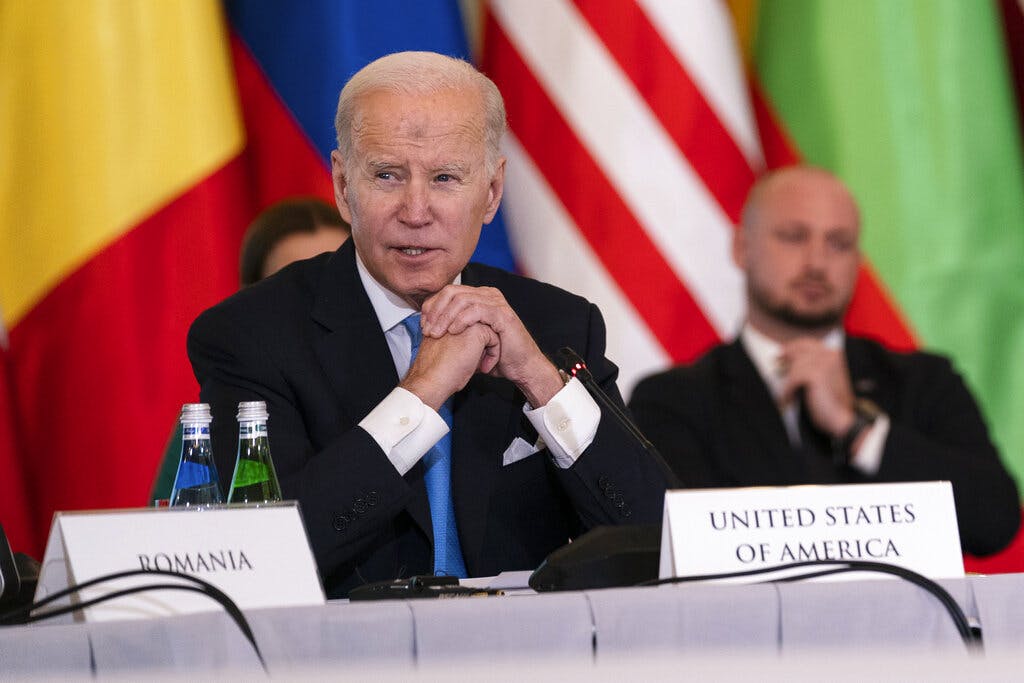Press Review: Biden Hit With Left Hook From Britain, While Georgia’s on a Frenchman’s Mind
Also, Greek impatience with war in Ukraine mounts.

How much of a war is about plunder and fortune and how much is mainly down to a clash of personalities? If Vladimir Putin’s well-documented paranoia led to his decision to invade Ukraine, it could be the outmoded mindset of a very different man — President Biden — that is unwittingly perpetuating it.
That is the surprising contention of a prominent columnist for Britain’s traditionally left-leaning Guardian newspaper, and Simon Tisdall’s left hook is pretty hefty. In an article headlined, “Outdated and out of time: Biden’s crusade for global democracy is doomed to fail,” Mr. Tisdall praised Mr. Biden’s “energized performance” at Kyiv and Warsaw this month but also called his Cold War mindset “out of step with a changing world.”
While the president obviously singled out Mr. Putin in his remarks in Poland, he also, as Mr. Tisdall perceives it, “rhetorically targeted anyone who challenges the western democratic model” — and “this includes governments ruling at least half of humanity, such as China and India and many African states.”
The British commentator is not the only one to realize the slew of challenges engendered by today’s “fractured, fragmented world,” and one that is “multipolar and geopolitically complex.” His worry that Europe’s security “hinges on the views, however passionately held, of a frail, 80-year-old man” was echoed by the New York Times, which this month described the war in Ukraine as “increasingly a contest between two aging cold warriors, one 70 years old [Putin] and another who just turned 80.”
Because geopolitics like nature abhors a vacuum, the major European powers are now trying to fill it. The jury is out on whether they will succeed, but the effort is percolating as winter begins to recede. Greece’s foreign minister, Nikos Dendias, waded into the fray by telling the OSCE Enhanced Permanent CouncilL “What we ask is for this war to end immediately, completely and with no conditions because this is the only way for real dialogue to begin.”
The pragmatic Mr. Dendias knows, though, that getting Moscow to put the brakes on its war machine is not as simple as making a wish. “The Greeks do not have feelings of hostility for the Russian people. The thing we are against is revisionism and the created tragedy,” he also said, adding: “Greece and its allies will continue to support Ukraine for as long as this irrational war continues.”
Even if the war were to stop tomorrow, the impact of Russia’s aggression and the Western response to it would reverberate around the world economically and culturally, but especially politically.
While the war is in stalemate mode in the Donbas, few believe that the Kremlin only has its eyes on Ukrainian geography. As the Sun reported last week, this month Mr. Putin revoked a decree from 2012 that was in part meant to “promote the formation of Abkhazia and South Ossetia as modern democratic states.” Russia and a handful of countries consider Abkhazia and South Ossetia to be independent and have backed them militarily, but Georgia claims both as part of its rightful territory.
Earlier this month Politico reported that the mistreatment of a jailed former Georgian president, Mikheil Saakashvili, could jeopardize Western-oriented Georgia’s ambition to one day join the European Union. Reports that Mr. Saakashvili is suffering from poisoning while incarcerated at Tbilisi, the Georgian capital, appear to be corroborated by a leading French intellectual figure, Bernard-Henri Lévy, who posted to Twitter a photo of a handwritten letter from Mr. Saakashvili to that effect.
As both Ukraine and Moldova jockey for membership in the European bloc, events in Georgia are largely, but not completely, off the crowded radar at Brussels. A mostly symbolic European Parliament resolution this month stated that “the continuing failure to improve the situation of former President Mikheil Saakashvili will continue to damage Georgia’s reputation and hamper its European Union candidacy prospects.”
In the tangled politics of the Caucasus, distinguishing villain from political beau idéal can itself be a treacherous undertaking — things are much simpler on American shores. According to MSNBC, the transportation secretary, Pete Buttigieg, “isn’t the villain” in the toxic East Palestine train derailment fiasco. That may be so, but then many in Ohio are still understandably holding out for a hero.

